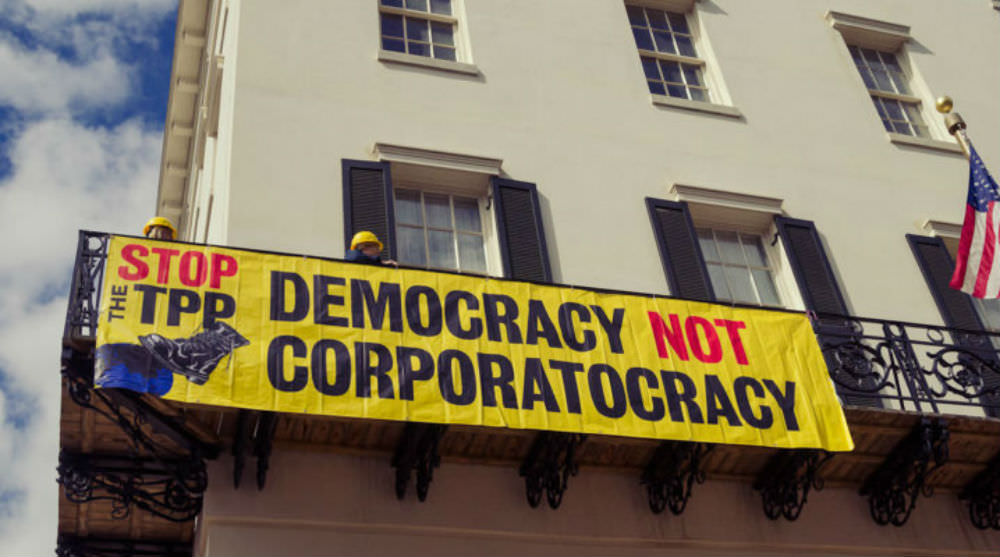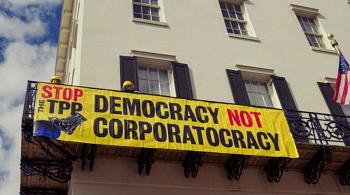TPP Threatens Indigenous Peoples Rights, Says UN Special Rapporteur
The Trans-Pacific Partnership (TPP) agreement threatens Indigenous land rights, says Victoria Tauli-Corpuz, the United Nations Special Rapporteur for Indigenous Rights.
According to Telesur:
The Trans-Pacific Partnership agreement, better known as the TPP, seriously threatens indigenous land rights, as well as the natural resources they preserve, U.N. Special Rapporteur on the Rights of Indigenous Peoples Victoria Tauli-Corpuz said. According to Tauli-Corpuz, the major issue with the TPP is ‘the clause of non-discrimination between a local and an international investor … (it) grants more rights to transnational firms, often at the expense of indigenous rights’, she said in an interview with the International Work Group for Indigenous Affairs.
This is a crucial issue, she argued, as most of the remaining natural resources available on earth are located on indigenous lands — because protecting them is part of the indigenous culture, or because they are located on remote lands.
Canada and 11 other countries – the United States, Australia, Chile, Brunei, Japan, Peru, Mexico, Vietnam, Singapore, Malaysia, and New Zealand – signed the controversial agreement in New Zealand earlier this month.
On the eve of the signing, indigenous groups in New Zealand labelled the TPP is “a death sentence for indigenous rights.” In a press release, the Māori opposed the deal on the ground that it’s “colonization by corporation” and that it “represents a significant and disruptive challenge to Maori.”
RELATED: Canada and TPP partners to sign “death sentence for Indigenous rights”
Other critics have argued that the TPP, the world’s largest economic trade agreement, which will encompass more than 40 per cent of the world’s GDP once it’s ratified, prioritizes corporate rights over human rights. They have also pointed to the “climate denial in the TPP trade agreement.”
In a report submitted to the UN General Assembly last August, Tauli-Corpuz outlined the impact of trade agreements on the rights of indigenous peoples.
According to the report’s summary:
The Special Rapporteur contends that investment clauses of free trade agreements and bilateral and multilateral investment treaties, as they are currently conceptualized and implemented, have actual and potential negative impacts on indigenous peoples’ rights, in particular on their rights to self-determination; lands, territories and resources; participation; and free, prior and informed consent.
The report highlighted the Special Rapporteur’s concern about the “unjust elements of the prevailing system of global economic and financial governance and the constriction of the protective capacity of States and local governance systems.” It noted that indigenous peoples, who are “some of the most marginalized in the world, bear a disproportionate burden of a system that contains systemic imbalances between the enforcement of corporate investors’ rights and human rights.”
The report concluded that “a more thorough review of implications of international investment and free trade agreements and deeper policy and systemic reforms are needed to ensure the respect, protection and fulfillment of indigenous peoples’ rights.”
Read the UN Special Rapporteur for Indigenous Rights’ report.
SPECIAL APPEAL: Please empower The Canadian Progressive and help us publish more stories like this by supporting this GoFundMe Fund-raising Initiative. Thank you!
Obert Madondo is an Ottawa-based progressive blogger, and the founder and editor of The Canadian Progressive. Follow him on Twitter: @Obiemad
Read More..
Comments
There are 0 comments on this post













